As someone who grew up immersed in Chinese culture and someone who loves dogs, it stung to read on social media in early January that “a young man was beaten, told to go back to China, called a communist and dog eater” during a protest in Los Gatos.
It made me feel a little less human.
“Dog eater.” The remark seemed bizarre, yet calculated to make Chinese people sound barbaric.
“These thugs need to be held accountable for the hate crime. Protest all you want, but don’t hurt people. This is so disappointing. So unnecessary. So unacceptable. Shame on those that can’t protest peacefully. #losgatos #racist #stopthehate,” Susana Craig, a resident of Monte Sereno, wrote shortly after the incident.
People at the scene dispute what actually happened, but police investigated the altercation and submitted their findings to the Santa Clara County District Attorney’s office in mid-January.
One online video shows a woman throwing a beer at someone filming the incident. Another shows an Asian man charging at the woman.
The DA’s office has filed no charges to date. Nevertheless, the episode rocked a town known for its neighborliness, good schools and walkable downtown. It also mirrored a tension gripping the rest of the country.
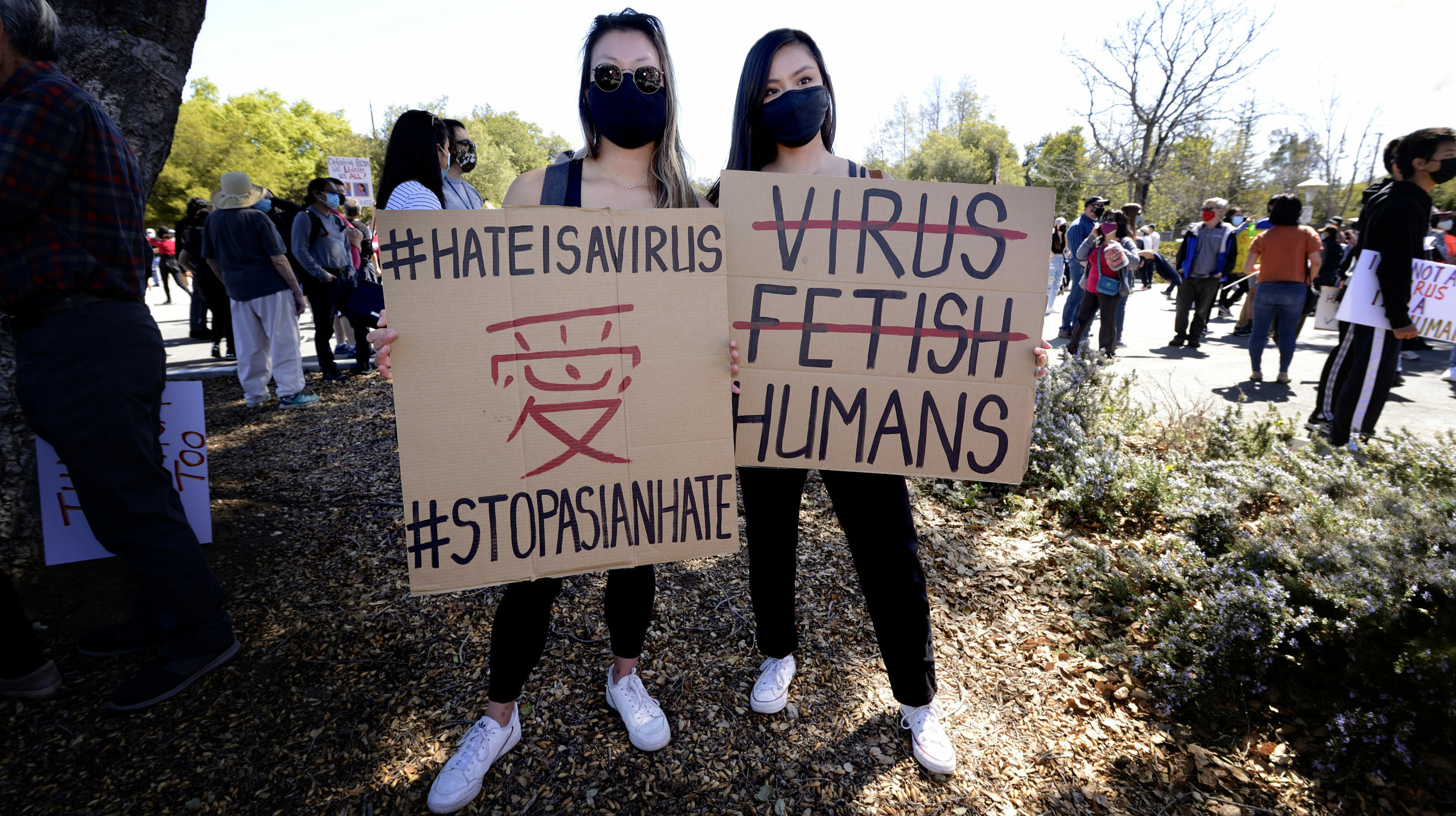
Two women hold signs during a protest against AAPI racism March 27 in Saratoga. (Photo by Greg Ramar)
Rhetorical Fallout
The Los Gatos altercation preceded the sacking of the U.S. Capitol by former President Donald Trump supporters, and it erupted as several rhetorical memes converged in the national conversation. Trump early on assigned blame for the coronavirus in repetitive tweets by referring to it as the “Chinese Virus”, and he labeled the Black Lives Matter movement “an extreme socialist” organization.
In small town Los Gatos, these themes burst forth, weaponized in a fight between civilians on opposite sides of the political spectrum—culminating a year of simmering mistrust. Locally, BLM activists and Trump supporters had engaged in low-level confrontations during the run-up to the election. I had confrontations with some Trump supporters online on NextDoor when some of them posted flat-out falsehoods or misleading information about election integrity, among other things.
As tense conversations about race and privilege continue, the pandemic and subsequent lockdowns have upended life. Emotions course through cities large and small in the Bay Area and across the country.
Even in the tolerant and diverse Bay Area, Asian Americans continue to be scapegoated for the pandemic. The past few weeks seemingly brought fresh reports of violence and acts of hate almost every day.
For example, Los Gatos-Monte Sereno police reported that a man on a bicycle pushed a Filipina nurse in scrubs to the ground, shouting “Go back to China” on Los Gatos Boulevard, a road right next to my house, as I wrote this.
Los Gatos-Monte Sereno Police Chief Peter Decena posted a video appealing for information from the public about the March 30 incident. “As a person of both Asian and Pacific Islander descent, I have been watching with shock and dismay the continuing acts of violence and hate being directed toward people who look like me,” he said.
“We are committed to keeping our community safe,” Decena said, “but also to ensuring that it remains a haven for tolerance, respect and acceptance.”
The assault appeared in a giant infographic of hate crimes and incidents against Asian American Pacific Islander (AAPI) people happening across the country that The New York Times published a day after the crime.
Hate crimes don’t encompass “hate incidents,” which refer to behavior such as name-calling, taunting, coughing on people or any number of other provocative acts committed to make people feel bad for who they are.
The non-profit coalition STOP AAPI Hate said last month that Asian Americans in all 50 states reported nearly 3,800 hate-related incidents between mid-March 2020 and the end of February 2021.
The official numbers vary depending on who’s compiling them and whether they’re official hate crime prosecutions or incidents. Both federal and local data on hate crimes and incidents are famously incomplete. Not only are victims often reluctant to report what happened to them, but the FBI’s data is based on voluntary submissions from local agencies, and on non-standardized reporting from all 50 states, according to crime analyst Jeff Asher of AH Datalytics.
“Unfortunately, the nation’s hate crimes data collection system is not set up to rapidly and accurately identify the when, where and why of rising hate crimes to better help the U.S. solve this problem,” he wrote in a late March blog post on Lawfare.
For what it’s worth, the FBI’s annual hate crimes report for 2019 shows that such crimes grew more violent than in previous years, and the assaults and murders were targeted largely at Jews and Latinos. It was also the third consecutive year with more than 7,000 hate crimes reported nationally—the highest levels in 13 years. A 2020 ABC News nationwide investigation found at least 54 criminal cases involved defendants who invoked Trump in direct connection with their acts of violence.
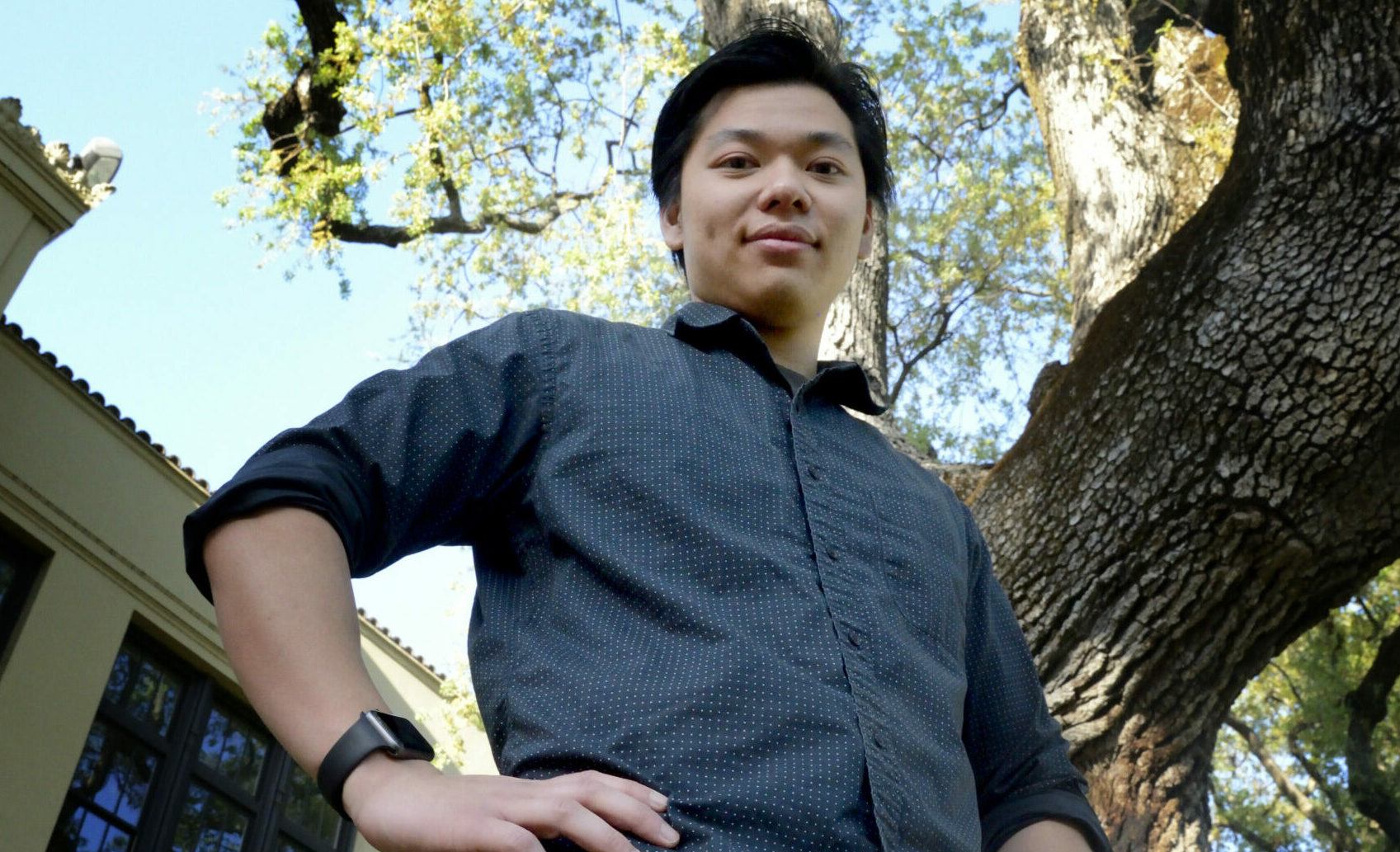
Jeff Suzuki launched the Los Gatos Anti-Racism Coalition last July after George Floyd’s death ignited the wave of BLM protests across the nation. (Photo by Greg Ramar)
What Hate Does
The “dog eater” comment and the chill it sent through me prompted me to explore how hate manifests in an act of aggression. I quickly found that its manifestations are far more subtle and profound than I had understood. For many people, latent assumptions based on their race have altered their lives and even family trajectories, and the latest hate incidents are no exception.
Take Los Gatos resident Jeff Suzuki, whose heritage is Chinese, Japanese and Vietnamese. A 2020 UC Berkeley economics graduate, he says he wasn’t comfortable in his own skin until he left his hometown, where almost 72% of residents are white.
“The number of times where I was asked where I am from and told ‘Ching Chong’ caused me to believe that casual racism was just normal growing up,” he says of his experience at Los Gatos High School. “It was so normalized that I even took part in self-deprecating comments about Asians to feel like I belonged.”
Those were just the overt comments. Growing up, people assumed he was physically weak because of his race. He was bullied. People made comments about eating dogs and cats. He recalls telling a friend in high school he wished he were white.
“And like death by a thousand paper cuts, this cumulative effect took a real psychological toll on me. I had severe self-esteem issues and suicidal ideations in high school,” he says.
I also got a surprisingly public look at the pain inflicted upon Asian Americans’ psyche when I attended a rally at San Jose City Hall in March.
When Mountain View Mayor Ellen Kamei stood up to speak at the anti-AAPI Hate rally, her voice audibly broke. She sounded almost as if she were begging.
“I hope that when you look at us, you'll see us as real humans who are trying to make a difference in the community, and that you can be our allies. You can help all of us in making our communities better and to continue saying: ‘We don’t need to be a place of hate,’” she said.
When I followed up with Kamei, she said what pushed her over the edge was the nagging worry about her father being violated, even after all these years and generations of her family laboring to become model Americans. She was glad that her paternal grandparents weren’t around to experience the hate—again. They had been interned at and married in Heart Mountain, a Japanese internment camp in Wyoming in 1942 and that’s where Kamei’s father was subsequently born. (Kamei’s mother’s heritage is Chinese and Puerto Rican.)
“They didn’t teach my father and my aunt Japanese because they wanted to be so American, and they only bought American products in the household—they wanted to be as American as possible,” she recalled in a phone conversation.
“My dad achieved the American dream of going to college, and going to grad school. To see this—their granddaughter telling her father: ‘Don't go outside because I'm afraid of what will happen to you’—I mean, I feel like there are no words to express the heartbreak and the pain of that.”
Kamei’s concern for her father echoed that of many Asian Americans I spoke with all around the Bay Area. Noe Valley resident Gerry Jue, for example, said his widowed 88-year-old aunt, a former ballroom dancer who used to amble down her North Beach neighborhood streets slowly with her cane, is now too scared to go out on her own. That just adds to her isolation as she’s sheltering in place.
That’s not to say that younger Asian Americans have it easy on the streets. Jenny Shao is a Chinese American broadcast graduate student at San Francisco State and a city native with bad allergies. Within the past year, a man chased and assaulted her with an umbrella after he perceived that she was sniffling and decided she’d veered too close to him on Fourth Street without a mask. Another man shouted out a racial epithet to her on Market Street and yet another told to keep her distance on a BART platform as the individual—in a seeming non-sequitur—boasted about being a Trump supporter.
Shao gets upset about the attacks, but says she isn’t traumatized. If she sees that someone is about to antagonize her, she whips out her iPhone to document any potential confrontations. In the case of the racial epithet incident, she shouted at the man to repeat what he’d said on camera. Instead, he walked away. Even before to the pandemic, though, she learned self-defense after getting jumped at a BART station.
Thousands of people across the country are engaging in their own upstander street trainings against harassment.
At a “Love Our People, Heal Our Communities” rally in Oakland, I met Ivana Lee Fedor, who was there with her two young children and her husband. Her children were holding “I am not a virus” signs.
Fedor told me that many staff members at Vituity, the healthcare services company she works for, were completing trainings with Hollaback!, a non-profit that started off as an organization to help women defend themselves and others against street harassment. The group has partnered with dozens of Asian American interest groups to conduct “upstander” trainings, showing people how to be mindful and prepared should they be confronted with race-based hate.
The group has trained more than 16,000 people in the past year, its Deputy Director Jorge Arteaga told me.
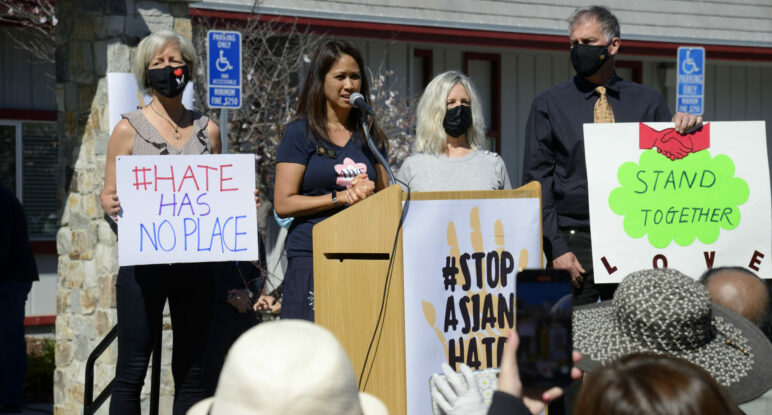
Los Gatos Mayor Marico Sayoc speaks at a Stop Asian Hate rally March 27 in Saratoga. (Photo by Greg Ramar)
Defining a Crime
But do any of Shao’s experiences rise to the level of a “hate crime” though, and what can be done if so?
“We don’t have laws against hate the United States—we have the First Amendment, which allows people to say reprehensible, despicable and vile things publicly and to one another in all sorts of forums,” explained Jay Boyarsky, Santa Clara County’s chief assistant district attorney, in a recent meeting on hate crimes convened by Palo Alto’s Human Relations Committee. “No one should think that hate crimes laws are laws against hate, because they're not.”
What Boyarsky means is that we can’t regulate emotions and their expressions, but we can prosecute illegal or criminal acts fueled by hate or bias against entire classes of people just because of who they are. To do that, prosecutors usually have to collect enough evidence and couple that with a statement clearly uttered so they can convince a jury of 12 unanimously that bias is the motivation behind a crime.
For example, in early March, the DA’s office charged Karen Marie Inman, a woman who was apparently homeless, with a hate crime when she spat at someone having lunch in Mountain View and told him to go back to “where you came from.” Someone in the vicinity witnessed this and other incidents involving Inman and called the police.
For her part, Shao did file a police report against the man who caused her head to bleed with an umbrella, but no charges were filed that she knows of. She also reported the BART platform incident, but the BART police were “dismissive,” she says.
Hate crime prosecutions are relatively uncommon. In 2020, Santa Clara County prosecuted just 14 of them. The office prosecuted just two the year before. Meanwhile, the office filed just more than 24,000 criminal cases against adults in 2020.
Just as hate crimes are “message” crimes to categories of people, so too is hate crime law largely symbolic: People who commit hate crimes are prosecuted for the underlying crime, and if convicted, they get a sentencing enhancement and the term “hate crime” added to their case.
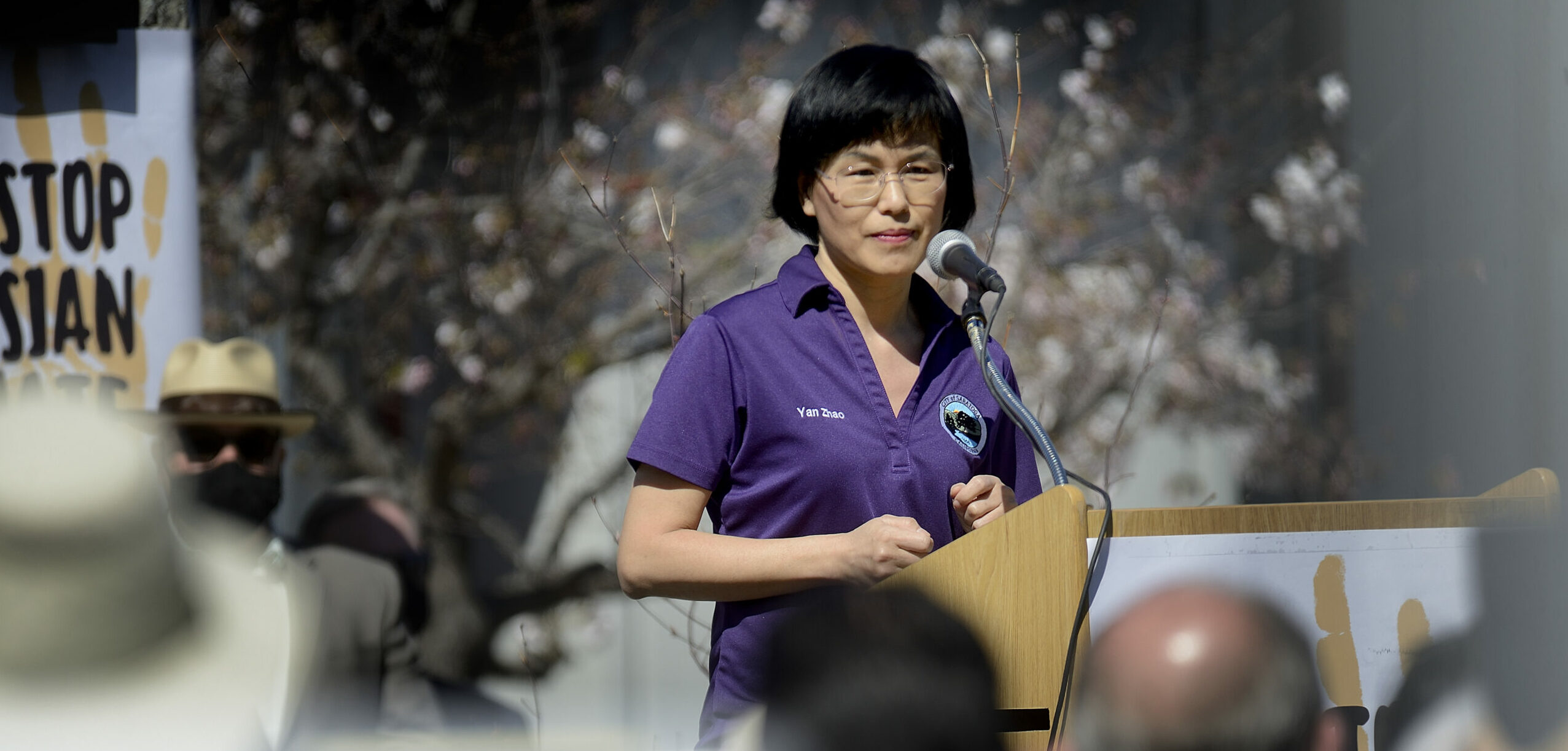
Saratoga Mayor Yan Zhao Yan speaks to a crowd during a protest against AAPI racism March 27 in Saratoga. (Photo by Greg Ramar)
Stemming the Deluge
Following the January brouhaha and the ongoing real-life and online battle against local commercial establishments and teens who support BLM, Los Gatos’ local leaders, led by Mayor Marico Sayoc, convened a town-wide upstander training session. It devolved into accusations from both conservatives and progressives of violent attacks made by the other side.
The town also created a police database of hate incidents to better track trends and make sure its law enforcement officers stayed up-to-date on state-mandated hate crime training. The police also started more foot and bicycle patrols downtown, among other actions.
Some local residents don’t feel more police resources are the answer. One of them is Suzuki, the 22-year-old Los Gatos resident and Berkeley economics graduate. He’s also the founder of the Los Gatos Anti-Racism Coalition, a group he launched last July after George Floyd’s death ignited the wave of BLM protests across the nation. The coalition has grown to 348 members online.
Consuming almost 37 percent of the town’s fiscal 2020 to 2021 budget, Suzuki argues Los Gatos is already over-policed. He wants the town to reallocate some of that money to fund staff to work on the town’s diversity and inclusion efforts.
With its diverse student population, Berkeley opened up the world for Suzuki. Now he wants to push his hometown to create an environment where students celebrate their identities instead of hating themselves for not being white, or whatever identity that doesn’t conform to the majority.
Like many progressives in the Bay Area, Suzuki and his coalition prioritize making housing more affordable, police accountable and the history curriculum more inclusive to move that needle.
The coalition has worked hard over the past several months to engage town leaders to hold town-wide discussions to explore these subjects and to include diversity, equity and inclusion into its city planning documents. The group has also worked with the council to make the police more accountable by having them audited.
Suzuki is also learning the ropes of development. The council appointed him to the Planning Commission in January. He says he wants to rid the town of its anti-development leanings and instead adopt a more “proactive” stance to fulfill its state-mandated housing development obligations.
The young Berkeley-trained economist has already made a mark on his town’s education system: The Los Gatos Unified School District board unanimously approved a resolution “supporting social justice, equity, inclusivity and denouncing discrimination of all kinds,” in February.
The district is implementing a new curriculum and training its staff this summer and some of its history staff read a 4,142-word paper Suzuki authored entitled “Philosophy of Teaching Anti-Racist History,” which critiqued history as it’s currently taught and proposed changes that were echoed in the resolution.
Under the new regime, eighth-grade students might have to take a closer look at some of the country’s previously heralded heroes with heretofore unblemished pasts. Students are likely to be asked to construct and deconstruct competing interpretations of our past—and the significance of those interpretations.
“I think we’re just being a little bit more deliberate about making sure all groups are represented in the way we present U.S. history,” says Arcia Dorosti, LGUSD’s director of K-12 curriculum, instruction and assessment.
The resolution is also meant to support district teachers’ efforts to make their classes more rigorous and inclusive. Dorosti recalled an eighth-grade history teacher at Los Gatos’ Raymond J. Fisher Middle School saying, “We want to do this kind of work, but every time we do, we get pushback from a few parents.” He told Dorosti that the administration in the past told teachers to “back off” and “keep the peace.”
But Dorosti says in the wake of last summer’s national racial reckoning “we need to be able to do this work.” He consulted with colleagues in other school districts with similar resolutions, worked with the chairman of Fisher’s history department and with Suzuki to come up with the verbiage that the board finally approved.
This is something U.S. sociologist James W. Loewen called for a quarter-century ago in his book Lies My Teacher Told Me.
People might disagree with the way various historians interpret the significance of historical events, but the goal is to enable students to construct and defend rational arguments, Dorosti says. The Los Gatos Anti-Racism Coalition is providing the district with feedback on the content, he added.
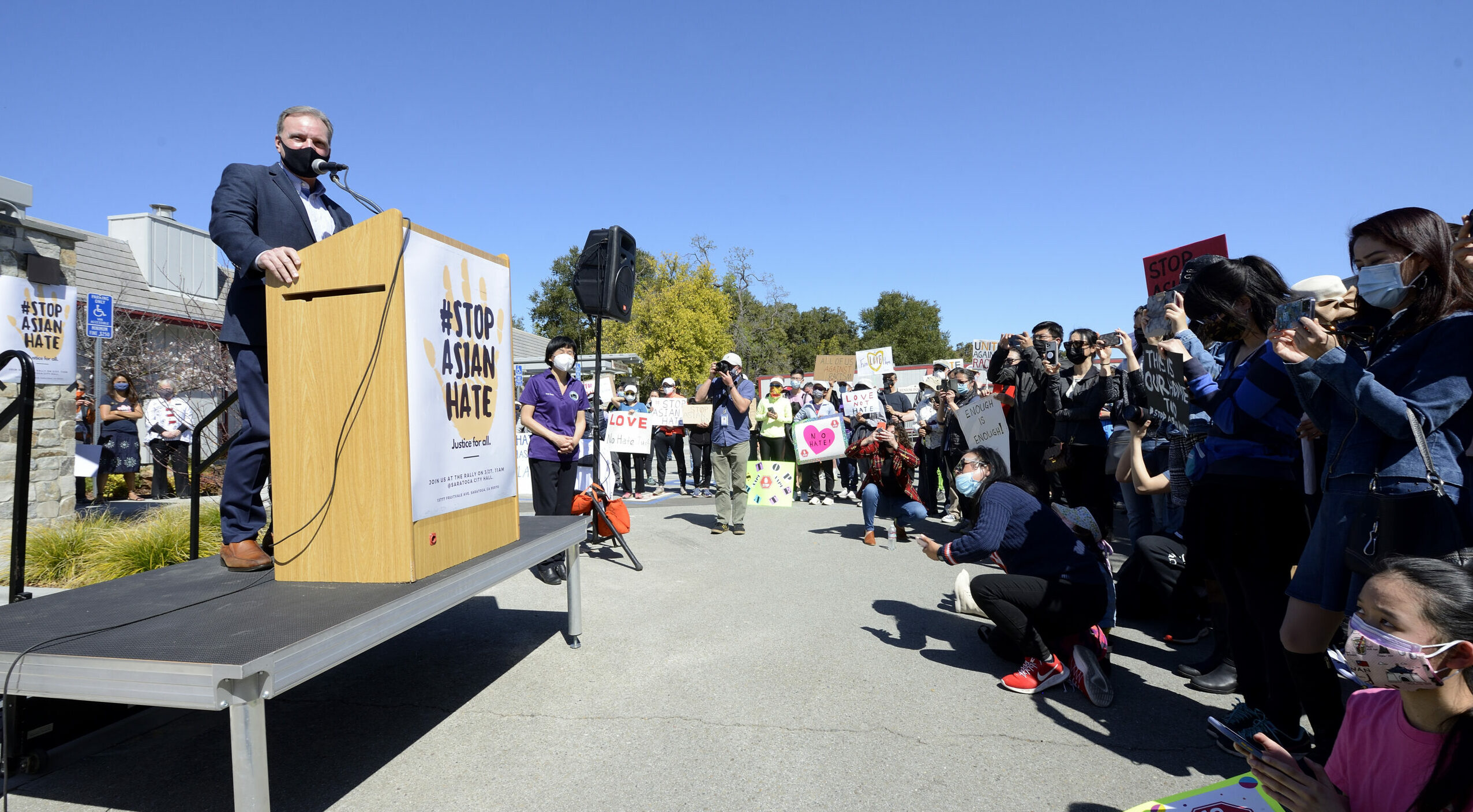
California Senator Dave Cortese speaks to a crowd during a protest against AAPI racism March 27 in Saratoga. Lawmakers and residents are pushing back on a growing number of hate crimes and harassment levied against AAPI residents. (Photo by Greg Ramar)
New Task Force
Meanwhile, Santa Clara County also launched a new hate crimes task force in February, with a mission to “develop a clear set of recommendations to address hate crime and violence incited by hate speech.” The task force plans to re-examine everything—from how we might inoculate future generations against the deadly virus of violence through education, to how we collect data on these kinds of crimes and incidents.
In March, the task force convened 15 representatives of people of different ethnicities, religious backgrounds, disabilities and sexual orientations to gather ideas to build cross-community resilience against hate.
Some of those ideas echoed suggestions elsewhere in the Bay Area. For example, since many hate crimes are committed by the homeless or mentally ill, perhaps local governments could do more to provide counseling to prevent the crimes from happening. Schools could also do more to educate young children about our increasingly diverse populations and their cultures and histories. Special interest groups could provide their members with more upstander training.
Short-term ideas included requests for more police patrols, better street lighting and figuring out how to protect and prepare Asian students as they contemplate going back to school in person.
Around the Bay Area, communities struggle to rebuild their resilience through mutual aid and pleading to anyone who will listen to separate the personal from the political.
“You know, people can hate Communist China, they can hate North Korea all they want, that’s fine,” Santa Clara County Supervisor Otto Lee said during a recent Zoom anti-hate brainstorming session organized by the youth policy group Young American Policy Advocates. “But don’t move that hate to us just because we look Asian.”

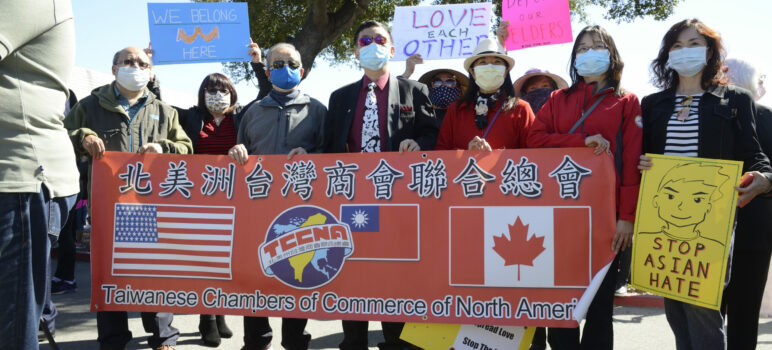
I think Jeff Suzuki is a courageous fellow and Ellen Kamei is a passionate activist. Sadly, Kathy Watanabe in Sants Clara furthered the Anti Asian hate by blocking her colleague, Kevin Park, from speaking while Wstanabe’s best friend. Debi Davis accused her opponent. Mohammed Nadeem of being a member of the Muslim Brotherhood.
It’s time to stand up and speak out until racism is rooted out. It’s present even in our schools.
@Sarah Lai Stirland: This was in Los Gatos in your own backyard, a huge gathering of Asian For Trump!! Were you on vacation then??
https://www.youtube.com/watch?v=5svc5bhNtXc
Also, Vietnamese strong support for Trump covered by CBS. LISTEN TO WHAT THESE ASIANS SAY ‘WHY’ THEY SUPPORT TRUMP!!
https://www.youtube.com/watch?v=NehY9oOaZLs
The reporter did also mention ‘Korean For Trump’ and ‘Filipino For Trump’. All this was on CBS!! Your little nobody knows paper is too small to cover big events such as these?? Or your bias political agenda leaves you no room for the fact Asians in big numbers also LOVE TRUMP?
You apparently never experienced the brutal hardship under communist totalitarian government? Well, that does not entitle you to be dismissive of the fact that communist escapees are living in your community, your town, your state and in USA! They risked their lives fleeing communism to be in USA. They LOVE President Trump who has the courage to stand up to communist china and promise that USA will never a socialist country.
It is a disgrace that you close your eyes to these Trump loving communism escapees, and our arrogance in dismissing and marginalizing them is truly despicable!